To celebrate the fiftieth anniversary of the longest-running science-fiction show in the world, I’ll be taking weekly looks at some of my own personal favourite stories and arcs, from the old and new series, with a view to encapsulating the sublime, the clever and the fiendishly odd of the BBC’s Doctor Who.
Resurrection of the Daleks originally aired in 1984.
The universe is at war, Doctor. Name one planet whose history is not littered with atrocities and ambition for empire. It is a universal way of life.
Which I do not accept.
Then you deny what is real.
– yes, in case you’re wondering, the show did let Davros win a philosophical debate with the Doctor
It’s a bit of a cliché to suggest that writer and script editor Eric Saward didn’t actually like Doctor Who. It’s a bit of sensationalist nonsense that appears quite frequently in discussing his contributions to the series. The evidence most often cited in favour of this admittedly exaggerated position points out that Saward had a tendency to marginalise the Doctor within his stories, to portray the character as inefficient or ineffective within the context of an increasingly cynical universe. This characterisation of the Doctor as inherently weak really came to a head during the Colin Baker period of the show, but you can see traces of it during the Peter Davison era, most notably in Earthshock.
However, Resurrection of the Daleks also provides a pretty compelling case study, if only because it makes a compelling case for the Doctor as a massive hypocrite and a coward. You have to worry when the script seems to side more with Davros’ outlook on life than with that of the title character.
Resurrection of the Daleks opens with the sight of police officers holding semi-automatics and gunning down extras in silly outfits. If you wanted an image to support the assertion that Eric Saward thought that Doctor Who needed a bit more cynicism, you won’t top that introductory scene. You could interpret the sequence as a clear attempt to “finish off” the goofier elements of Doctor Who, including those unconvincingly-attired future space people. Bringing them all out into an alley way and having them executed by a psychotic anti-hero carrying a semi-automatic is a pretty bold statement.
Of course, perception is coloured by surrounding events. In the eighties, a lot of geekish pop culture made an effort to “grow up”, so to speak. Comic books, for example, went through something of a revolution with Watchmen and The Dark Knight Rises. Those two stories picked apart several of the idealistic fantasies and conventions of superhero comics, and prompted a wave of inferior imitations from creators who assumed “violent”, “cynical” and “nihilistic” were all synonyms for “mature.”
Part of this shift seems to have come from the fact that people you had grown up with these stories were now the ones writing them – quite similar to what happened with Doctor Who, with fans like Ian Levine and Eric Saward getting more involved with the production of the show. Of course, as you grow up, the desire to is to demonstrate that the thing you love so dearly is not as stupid or as childish or as immature as people might think. In the hands of great writers, you end up with Watchmen or The Dark Knight Returns. In the hands of lesser writers, you end up with Attack of the Cybermen.
Still, Resurrection of the Daleks is a slightly more interesting case than the story that opens the following season. While both stories feature iconic monsters and the mercenary Lytton who evolves from a sinister cohort to a grim anti-hero, there’s a significant difference between them. Attack of the Cybermen ends with the distinct impression that Lytton is the true hero of the piece and the Doctor is a narrow-minded fool who made little or no difference in the grand scheme of things. It feels like a total rejection of the optimistic ethos of Doctor Who.
However, while Resurrection of the Daleks does portray the Doctor as inefficient, it also closes with the notion that this really isn’t business as usual. Tegan’s departure scene comes a bit out of left-field, but it contextualises the episode in a way that just doesn’t happen for Attack of the Cybermen. Through Tegan, Saward gets to effectively condemn his own story. “A lot of good people have died today,” she protests. “I think I’m sick of it.” The viewers would probably agree.
This feels like a complete collapse of a Doctor Who story, a tale about an ineffective Doctor who simply isn’t up to the task set to him. The departure of Tegan is a fairly effective indication that the centre cannot hold – that Resurrection of the Daleks might be an interesting way of looking at the show, but not one that the series can support over an extended period. “It’s stopped being fun, Doctor,” Tegan suggests, which is about the most damning criticism you could possible offer of Doctor Who.
The positioning of the episode is also somewhat redeeming. We’re now clearly barrelling towards Davison’s eventual regeneration. The news had been announced quite a great deal in advance, so there was a sense that end is nigh. It’s particularly obvious in this run of serials, as Turlough will be departing in Planet of Fire, before the Fifth Doctor himself bows out in The Caves of Androzani. As such, this cynicism could be read as a sort of fin de siècle sentiment – something similar to the theme of entropy that wove its way through the Fourth Doctor’s final year.
Even the Doctor seems adamant that the brutality and nihilism here can’t be sustained. “It’s strange,” he remarks. “I left Gallifrey for similar reasons. I’d grown tired of their lifestyle. It seems I must mend my ways. Come along.” Yes, change is necessary – and it’s possible to write off a great deal of the oppressive and bleak outlook of Resurrection of the Daleks as a sign that the Fifth Doctor has had his time in the sun. It’s time to move on, to give way, to make room. It’s a depressing reading of the story, but at least it would make some sense of Resurrection of the Daleks.
However, I’m not convinced that this is intentional. After all, Resurrection of the Daleks was originally intended to close out the previous season, making the Daleks part of the celebratory twentieth anniversary season of the show. It would have led into The Five Doctors. As such, Tegan’s departure was not always intended to be part of the script, and the placing of the story as part of the lead-in to the Fifth Doctor’s regeneration is more chance than evidence of some grand plan.
This argument is supported by the fact that Eric Saward’s outlook doesn’t really seem to shift too much once the Fifth Doctor is gone. As I mentioned, Attack of the Cybermen presents the Doctor as a passive and ineffectual character, even though it’s the brash and in-your-face Sixth Doctor. Even Revelation of the Daleks doesn’t present us with a depiction of a heroic Doctor. Instead, the character spends the first forty-five minutes walking to the story.
So you could make an argument that Resurrection of the Daleks is indicative of how Eric Saward views the Doctor as a concept, rather than merely an attempt to create a funereal atmosphere around the Fifth Doctor in particular. And I think it’s hard to disagree too strongly with that. And yet, I think there is some interesting stuff here that works a lot better as one of the last Fifth Doctor stories than as part of the tapestry of Doctor Who as a whole.
Saward himself has been rather harsh on Resurrection of the Daleks, describing it as “the worst Doctor Who story ever written.“ I think that is perhaps a little too heavy a criticism to make of the story. Certainly, there are some good ideas here. I could be cynical and suggest that perhaps most of them are accidental, but there are still some interesting suggestions about the Daleks, even if they aren’t necessarily the most flattering.
For one thing, I like how Resurrection of the Daleks threatens to become an imitation of Terry Nation, before subverting that expectation entirely. Saward has a knack for channelling the voices of other writers. His first script, The Visitation, was a clear attempt to channel Robert Holmes. He didn’t quite pull it off, but he came relatively close. Here, he sets up a premise that seems reasonably close to what we’ve come to expect from Nation as a writer.
There’s a bunch of bland space marine type characters doing bland space marine type stuff. For extra bonus points, the casting department seems in on the joke and has hired several wooden actors to fill the roles. They natter on-and-on-and-on about various inane things that don’t really matter. Saward dangles a number of possible cliffhanger reveals in front of, teasing us with the possibility that he’s going to emulate Terry Nation and keep the Dalek reveal for the first cliffhanger (despite the title of the serial) and then the inevitable Davros reveal for the second cliffhanger – much like Destiny of the Daleks.
The fact that the show was originally broadcast in forty-five minute chunks sort of already toys with and subverts that expectation. Can you imagine how annoying a Terry Nation Dalek story would be if you had to wait forty-five minutes to see a Dalek? But he also makes sure to show us the Daleks inside fifteen minutes. And they don’t simply roll on to the scene, they literally explode on to it. It’s a nice way of sort of twisting the pattern that we’ve become increasingly familiar with.
More than that, though, Saward seems to sabotage his own Davros reveal. Most of the first episode keeps referring to “the prisoner.” We’re not told who he is, but it’s clear that he’s important to the Daleks. There’s really only one sensible reveal, which means it isn’t much of a mystery – not that it isn’t the sort of “twist” that Nation would have run with. Anyway, Saward makes us think that the show is building to the big gigantic and predictable twist that Davros is “the prisoner”…
… and then the show goes ahead and puts him in the background in an early scene. It might have been a production screw-up, but it still seems like a parody of a Terry Nation plot twist. It’s a reveal that is so incredibly obvious that the episode might as well just come out and show you the answer, but the story keeps playing this predictable plot point for all that it is worth. It seems that a large amount of Resurrection of the Daleks is built around the fact that Eric Saward really disliked Destiny of the Daleks, which is something I can get behind.
Indeed, Saward even takes care to end the bizarre Movellan War subplot that Nation introduced in Destiny of the Daleks. He does so in a way that makes it perfectly clear that he considered the whole plot a bit stupid. After all, the stalemate logic doesn’t really work. A conflict between two different logical systems doesn’t necessarily lead to a stalemate, because that relies on the assumption that both sides are equal and every move can be countered.
Apparently the Movellans came up with a logical strategy that the Daleks couldn’t counter, which really just seems like common sense. “They developed a virus which exclusively attacks the Daleks. The fleet was destroyed. Those who survived went to separate parts of the universe to escape the risk of further infection and work on a cure.” It’s also worth noting that Saward also makes a point to retroactively amend Nation’s decision to make the Daleks completely robot in Destiny of the Daleks, just in case you were unsure how he felt about that particular story.
And here’s something interesting about Resurrection of the Daleks – it makes a point to draw attention to how weakened the creatures are as a concept. The Daleks blast into the space station in a wonderfully effective moment… and are immediately humbled. “Under attack!” they scream. “Withdraw! Regroup!” The scene turns “withdraw! withdraw! withdraw!” into a Dalek catchphrase. The point is clear. The old Dalek paradigm isn’t quite working. It’s old and outdated. “Fools! I told you this would happen,” Lytton boasts. “Your battle tactics won’t work.”
Resurrection of the Daleks makes a concession that no earlier Dalek episode would fully commit to. It basically admits that twenty years of watching the Daleks lose has turned them into a bit of a joke. Terry Nation raised the point in Destiny of the Daleks, but – even then – he couldn’t concede to the Daleks losing. The worst that could happen in a major war with a species other than human would be stalemate. Which seems a bit surreal, seen as we’ve been watching the Doctor defeat them consistently since the very second serial.
Of course, admitting that a monster needs a revamp is not a bad thing. Tomb of the Cybermen did it for the Cybermen, and is generally considered to be one of the best stories featuring those monsters. Russell T. Davies would do it for the Daleks themselves in Dalek, and Steven Moffat would try to do the same thing a few years later with Victory of the Daleks. Sometimes, when a show has been running a long time, certain concepts need an overhaul. There’s no shame in admitting that.
Davros, of course, reacts to the news that the Daleks are a bit crap as you might imagine. Like a stubborn fanboy, he refuses to concede that there’s anything wrong. “Commander?” he repeats when he discovers the Daleks have outsourced some work. “My Daleks do not need troops!” Lytton has to break the news to the mad scientist, “They lost, Davros. They were totally defeated.” And yet Davros plays into that sort of diminishing of the Daleks, referring to what he considers to be the most feared race in the universe as nothing more than an “errant child.”
Of course, the problem is that Saward isn’t quite sure what to do once he has acknowledged that the Daleks are a bit crap. It’s all fine and dandy to point out that they are no longer scary, but you have to make a conscious effort to find something scary about them again. Saward’s solution seems to be giving Davros his own army of Daleks and starting a Dalek Civil War. Which, inevitably, ends badly for the Daleks, with all the creatures apparently dead. So instead of admitting the Daleks are a bit crap and making them cool again, Saward really only succeeds at admitting they are a bit crap and killing them all.
To be fair, there is some smart stuff there. You can really see the influence of Resurrection of the Daleks on Russell T. Davies’ early Dalek stories. Even on a superficial level, the revived series has been very fond of showing the mutants inside the Dalek casings, looking like an updated design of those featured here. The way that the Daleks exploit the systems of Earth in The Long Game seems like a more sophisticated method than their attempts to hide the virus on Earth in 1984, using police and army officers to guard the cannisters for them.
You could even make a convincing argument that the “killer or coward” debate at the end of The Parting of the Ways is an attempt to “fix” the confrontation between the Fifth Doctor and Davros. It’s a very similar set-up. The Doctor is put in a situation where he can save the universe through murder, while his adversary spurs him on. The Ninth Doctor eventually refuses to do it, a decision that Davies casts as a moral one. For better or worse, the Ninth Doctor can’t commit that murder because of a moral principle.
The problem with Resurrection of the Daleks is that it treats the Fifth Doctor’s inability to commit murder as a character flaw. The episode makes it clear that his initial decision to kill Davros is premeditated. “Once before I held back from destroying the Daleks,” he explains, referencing Genesis of the Daleks. “It was a mistake I do not intend to repeat. Davros must die.” So the Doctor admits that he refusal to commit genocide in Genesis of the Daleks was a “mistake”? That’s a fairly massive character shift, even between regenerations.
However, because the Doctor can’t follow through on that change of heart, the decision instead serves to point to the Doctor as a coward. It can’t be a principled stand, because he has declared his earlier principled stand a mistake. Indeed, when he confronts Davros, he reaffirms his decision. “Until I walked through that door, I foolishly hoped you’d changed enough for me not to have to do this.” So it’s clear that he never makes a conscious decision that it is wrong to kill Davros.
More than that, though, Saward doesn’t allow the Doctor to make any convincing counter-arguments to Davros’ rant. Davros argues that war is the natural state of the universe, and the Doctor’s only rebuttal is to suggest that he disagrees. Davros asks him to name one planet without a history of conflict, and the Doctor ignores the point. The counter-argument, by the way, is obvious – even if those worlds have a history of conflict, the goal is to evolve past it. It’s not a natural state, it’s a sadly common aspect of existence that we should transcend.
But the Doctor doesn’t say that. Saward makes it seem like he doesn’t have any firm basis for his beliefs. This plays into the idea mentioned above that the Doctor is ineffectual in a cynical and nihilistic universe. It’s that sort of grim outlook which suggests that hope and optimism are childish fantasies that don’t have any intrinsic value and only serve to mask the painful reality. In other words, it’s exactly that sort of nihilistic perspective that became associated with “mature” storytelling in comics.
However, Saward does more than allow Davros to win the philosophical argument. He goes a bit deeper. He goes for blood. He makes it personal:
You hesitate, Doctor. If I were you, I would be dead.
I lack your practice, Davros.
You are soft, like all Time Lords. You prefer to stand and watch. Action requires courage, something you lack.
This attacks the Doctor as a hero, and seems to suggest that he can’t really be a hero because he doesn’t conform to those macho stereotypes about how a real man is willing to kill or any of that nonsense.
As such, the Doctor’s inability to kill Davros isn’t just a staunch refusal on the grounds of principle. It’s portrayed as an act of cowardice. He can kill Daleks in huge numbers, but he’s unable to kill Davros – the inference is – because he looks a bit like a human. He’s afraid to get his hands dirty, the script seems to suggest. And, as a result, Mercer dies. Mercer, who was safe in the TARDIS, but left to help the Doctor kill Davros. Stein also dies, although maybe he would have died anyway. All this plays into the same moral outlook we see in Attack of the Cybermen, where the Sixth Doctor is a rather impotent hero.
The adventure also paints the Doctor as a bit of a hypocrite. Davros offers to give the Doctor his own army. The Doctor naturally rejects the offer, “I wouldn’t know what to do with an army.” However, he seems quite capable of ordering his associates around, who are quite capable of killing in his name. When two guards show up, the Doctor orders Mercer and Stein, “Outside, deal with them.” It’s possible that he meant “distract them”, but the situation is so tense and the tone so clipped it doesn’t seem like he honestly cares.
The Doctor is apparently okay with murder. He just doesn’t want to get his hands dirty. It’s a very cynical way of portraying the Doctor, and it definitely supports the assumption that Saward might not have been too fond of the character. Or, to be fair, he may have been engaging in some overwrought self-criticism. I suspect this is the episode that Russell T. Davies was explicitly pointing towards when Davros points out that the Doctor turns his companions into murderers in Journey’s End.
All this is compounded by the fact that Saward takes the time in the first episode to set up the Doctor as an innocent and romantic fool. After the Time Corridor drops them in 1984, he’s curious enough to want to investigate. “A hundred years ago this place would have been bustling with activity,” he laments when the TARDIS lands on the decaying quays, making it clear that the Doctor is a character out of place in the modern world. “It might be again when we find out who’s operating the Time Corridor,” Tegan points out, a rational observation, based on experience. The Doctor is having none of it. “Come on. Trouble with you, Tegan, you have no imagination.” Ah, the sad romantic fool. Completely unprepared for modern realities.
Even Turlough is portrayed as a more practical here. He advocates revenge to Mercer, suggesting that Mercer should live not just to escape, but also to kill Davros. “You may not be able to help your friends, but you could still kill him.” Turlough is still a little morally ambiguous, but it’s clear that the serial agrees with him entirely. Davros has to die, and the Doctor lacks the courage to do what needs to be done. Which is decidedly grim.
So this central ambiguity of Resurrection of the Daleks is the biggest problem. It might exist as a challenge to the Fifth Doctor’s nice-guy attitude, constructed to make him seem a bit weary, as part of a lead-in to The Caves of Androzani. On the other hand, it might just be a condemnation of the whole moral philosophy of Doctor Who, and a cynical attempt to demonstrate that the series’ optimistic outlook is somehow childish and stupid. There’s a lot more evidence leaning towards the latter, which makes it distinctly uncomfortable to watch.
On a strictly plotting level, Saward is a little over-ambitious here with the Daleks. The Daleks are apparently rescuing Davros from prison, while maintaining a time corridor to 1984 where they store chemical weapons, making duplicates to beat the band, and conspiring to assassinate the Time Lords. While some previous Dalek stories have felt a bit substance-less, Resurrection of the Daleks is quite overloaded. The script might work better if you jettisoned one or two of those plot threads.
Still, I have a certain affection for Resurrection of the Daleks, even if I’m not quite sure what to make of it. The ambiguity makes it all a bit interesting, even if the scenes between the Doctor and Davros are a bit problematic. It seems like Saward is about half-way to figuring out how to write a great Dalek episode, even if the result is a complete mess. It is, at least, an interesting mess. I’m not sure if I could argue that Resurrection of the Daleks is a good Doctor Who adventure, but it’s certainly a challenging one.
Filed under: Television | Tagged: arts, bbc, Colin Baker, Dalek, dark knight returns, Dark Knight Rises, Davros, doctor, DoctorWho, Eric Saward, List of Doctor Who henchmen, London, Regroup, Resurrection of the Daleks, science fiction, Sixth Doctor, tardis, Terry Nation, Time Lord, Unearthly Child |
















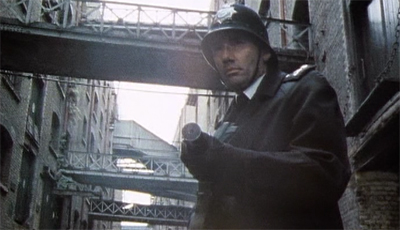

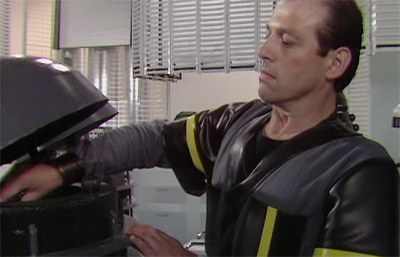
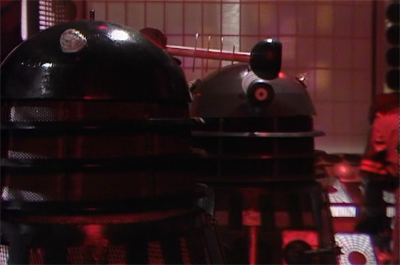
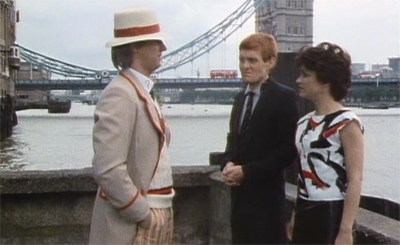




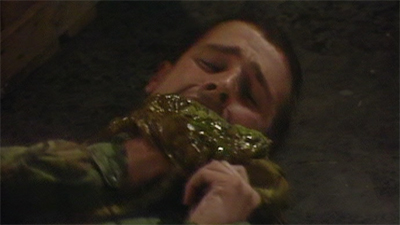


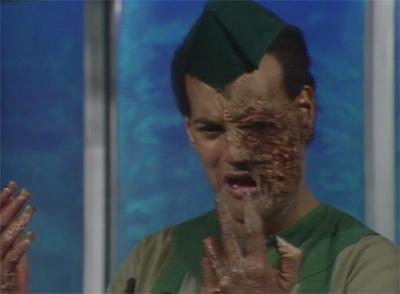











Leave a comment